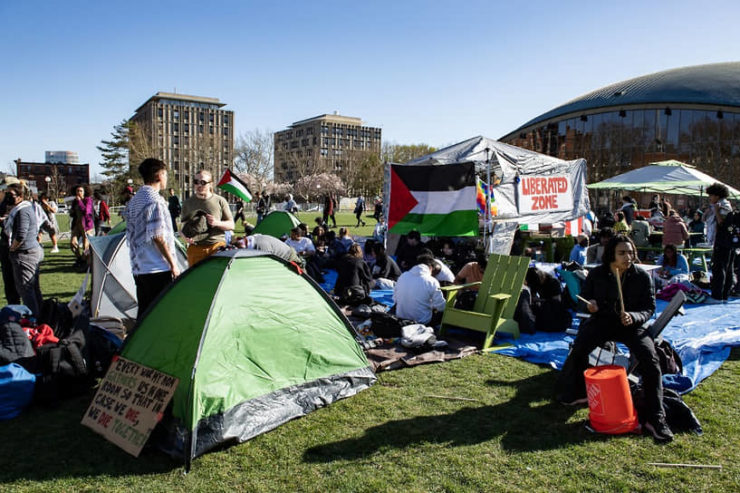
The colossal level of the West-backed destruction of life in Palestine and the (im)moral and material support the state of Israel has received from the US and its allies in Europe was enough to put serious question marks on the credibility, legitimacy, and acceptability of Western notions of democracy as the ideal form of government that must be universalised. Israel’s wars have seen some major protests in the West against their support for what is now clearly a genocide. But the so-called democratically elected governments have simply ignored demands put forth by these protestors. Instead, the neoliberal elite, which already has a very long history of killing millions in various wars since the beginning of the 21st century, proved true to its essence: an anti-people politics that creates, maintains, and reproduces a sharp distinction between popular demands and actual political decisions that are taken without taking the people into confidence. Taking the people’s demands into action matters, mainly because this is a fundamental claim of democracy. Ironically, it is this claim that is violated more often than not.
Ongoing protests across US universities against Israel and the subsequent crackdown against students are only a logical continuation of the illegality of the neoliberal model of politics, a situation that makes any criticism from the West on non-western systems of politics for being not ‘democratic’ enough equally illogical. More than a hundred students have been arrested merely because of their purely peaceful protests. Universities, which are otherwise supposed to be spaces for critical deliberation and reflection for the betterment of society, are in cahoots with the neoliberal political elites, serving their interests much more than the people in America. Hence, their resort to the use of force.
Columbia’s president, Nemat Shafik, said she had authorised police to clear the dozens of tents set up by protestors because they had breached the university’s rules and policies against holding unauthorised demonstrations and were unwilling to engage with administrators. Turning into spaces that appear to be policing society, Columbia and other universities are now suspending students for taking part in activism – activism that all of these students actually learnt from the very classrooms that these universities claim to be the world’s best spaces of learning. As irony would have it, these universities and their self-serving elites would not have imagined their students turning their learning into weapons of dissent. The question is: why is this activism so disturbing for the elites? A look at their demands might help shed some useful light on the issue.
Among the demands that these students are making are some that directly hit the material foundation of the West’s militarized logic. For instance, one demand is for these leading, Ivy League Universities to disclose and withdraw their connections with weapons manufacturers and firms involved with the Israeli military. This demand is in connection with a growing disaffection with the system itself, a system that has produced more wars in the past two decades alone and killed more people than the development it has produced and/or the number of people it has lifted out of the poverty line. This disaffection has a sound empirical basis, i.e., the system’s non-responsiveness.
In December 2023, a survey showed that 61 percent of US voters supported an immediate ceasefire in Palestine. On the contrary, only 11 percent of the Congressmen and Congresswomen called for a permanent ceasefire, showing a large political wedge between the elites and the masses. What this pattern shows is that only a small minority of the elites are actually ruling the American system. This small minority is afraid of the majority, i.e., the young, who are clearly against Israel’s genocidal war, and therefore it is willing to use all available means to suppress the majority in the name of ‘law and order’. However, in reality, it is only creating a much more polarized America, as recent surveys show.
If the key purpose of nationally elected leadership is to bridge these such polarizing gaps, the US president has only widened it in the past few months. For example, the recent bill passed by the US Congress has authorised the US government to provide billions in military aid to Israel, money that the latter will use directly to kill innocent Palestinian civilians including children. The logic that Biden has been advancing since October 7 is that of Israel’s so-called “right to self-defence”.
This disaffection is spreading in the US in myriad other ways too, creating space for right-wing populists like Donald Trump to emerge as a major threat and swinging a major chunk of the US population to the other side of the political extreme, culminating in what became the notorious attack on the US Congress in January 2021. Biden called that attack an attack on democracy, but Biden’s own conduct as president has been a manifestation of other forms of attacks on democracy not only in the US but also elsewhere. Indeed, its support for Israel’s approach towards Palestine is tantamount to supporting fascist political ideas, a disrespect for fundamental human rights and lives, and supporting a nationally mobilized killing machine that treats fellow human beings as non-humans that must be exterminated for the greater protection of Israeli interests.
In this context, it is not only significant but also interesting that a reaction to this fascism that presents itself as democracy is emerging from within the American society, a reality that would make it much harder for the American elites to link it back to any foreign hand. It is a crisis of the system. What remains to be seen is whether this system can resolve it. Chances are it will only exacerbate it.
Salman Rafi Sheikh, research-analyst of International Relations and Pakistan’s foreign and domestic affairs, exclusively for the online magazine “New Eastern Outlook”